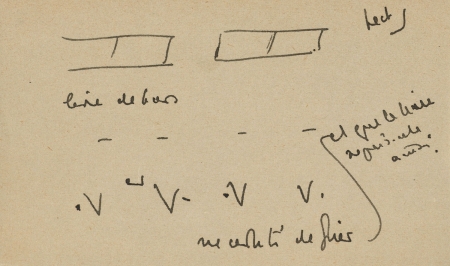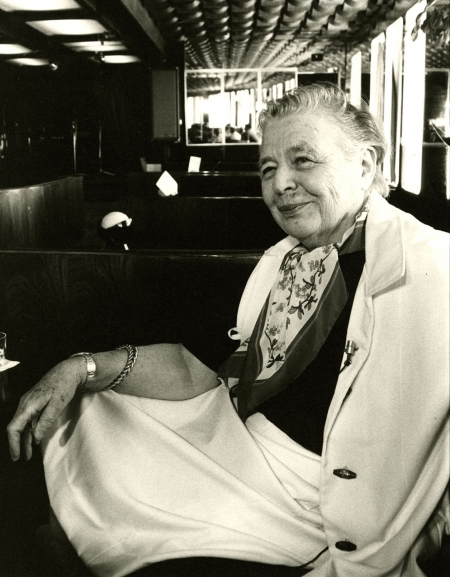
French literature of the 19th and 20th centuries is remarkable for its dynamism and diversity. Modern French authors were driven by many philosophical, stylistic, and political concerns. Through their efforts, new kinds of prose, poetry, and drama were born.
Houghton Library’s holdings in modern French literature reflect the many shifts in literary sensibility that marked this era. Its extensive collection of authors’ notebooks, drafts, and proof-pages provide insight into the creative processes of some of France’s greatest literary figures.
Romantics
Romanticism dominated French literature in the first half of the 19th century.
In poetry, the works of Alphonse de Lamartine, Alfred de Vigny, Alfred de Musset, Gerard de Nerval, and Aloysius Bertrand exemplified the lyricism and sentimentalism characteristic of Romanticism. Among the Romantic novelists and memoirists, Chateaubriand, Alexandre Dumas père, George Sand, Prosper Mérimée, and Victor Hugo are particularly noteworthy.
First editions of works by all of these authors are included in this collection. Many of these works were originally published as feuilleton, a kind of journal supplement introduced at the turn of the 19th century. In some cases they are preserved in that form in Houghton’s collection.
Also included in the collection are two serial publications from Dumas père, Mois and Le Monte-Christo, and manuscript drafts by Chateaubriand, Lamartine, de Nerval, Dumas père, and Hugo.
Houghton also holds many manuscript letters and compositions by George Sand.
Parnassians
Later in the 19th century, some poets tired of the Romantic style. The so-called Parnassians, led by Charles-Marie Leconte de Lisle, sought to restore formal considerations to the fore.

Works by Parnassians such as de Lisle, Leon Dierx, Catulle Mendes, René Sully Prudhomme, François Coppée, and Anatole France are included in this collection.
Realists and Naturalists
Novelists also moved away from Romanticism and toward realism or naturalism. Notable realist novelists whose works are included in this collection include Stendhal, Honoré de Balzac, Dumas fils, and Gustave Flaubert. Naturalists include Guy de Maupassant, the Goncourt brothers, and Emile Zola.
Houghton holds letters by Maupassant and Balzac, and multiple notebooks and manuscript drafts from Flaubert.
The Dreyfus Affair is extensively documented, including letters from Zola and many others concerned in the Dreyfus affair. The professional and family papers of Alfred Dreyfus's lawyer, Fernand Labori, provide a fascinating picture of the social context of this celebrated trial.
Symbolists
During the fin de siècle period, a renewed interest in the fantastic, the subjective, and the obscure crystallized in the work of the Symbolists.
Prominent Symbolists whose work is collected at Houghton include Joris-Karl Huysmans, Paul Adam, Paul Valéry, Gustave Khan, Jules Laforgue, Alfred Jarry, and the poètes maudits Charles Baudelaire, Arthur Rimbaud, Stéphane Mallarmé, and Paul Verlaine.

Proofs, manuscript drafts, and drawings from Huysmans, Adam, Baudelaire, Mallarmé, and Verlaine are included in the collection.
Dadaists, Surrealists, and Existentialists
The Symbolists heavily influenced the Dadaists, Surrealists, and Existentialists of the first half of the 20th century.
Members of these latter movements whose work is collected at Houghton include Paul Eluard, André Breton, Louis Aragon, Jean Cocteau, Jacques Prévert, Antoine Arnaud, Jean-Paul Sartre, Albert Camus, André Malraux, and Simone de Beauvoir. Manuscripts penned by Eluard, Cocteau, Sartre, and Camus are included in the collection.
The collection also features manuscripts and other papers from several innovative 20th-century writers not easily identified with a particular movement, including Maurice Blanchot, Louis-Ferdinand Céline, Pierre Louÿs, and Marguerite Yourcenar.
Online Exhibitions
Accessing These Materials
Information about items in this collection can be found via HOLLIS.